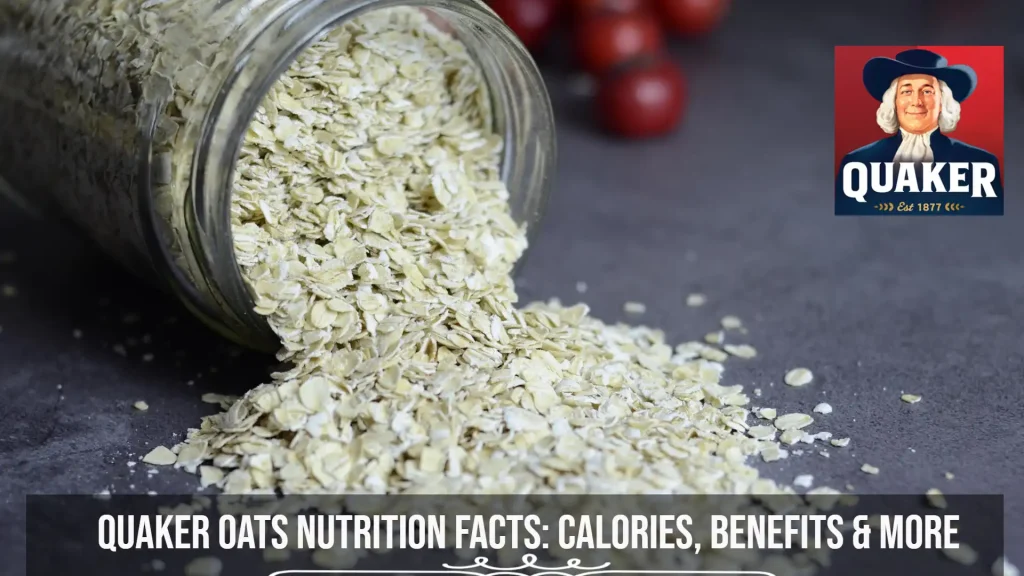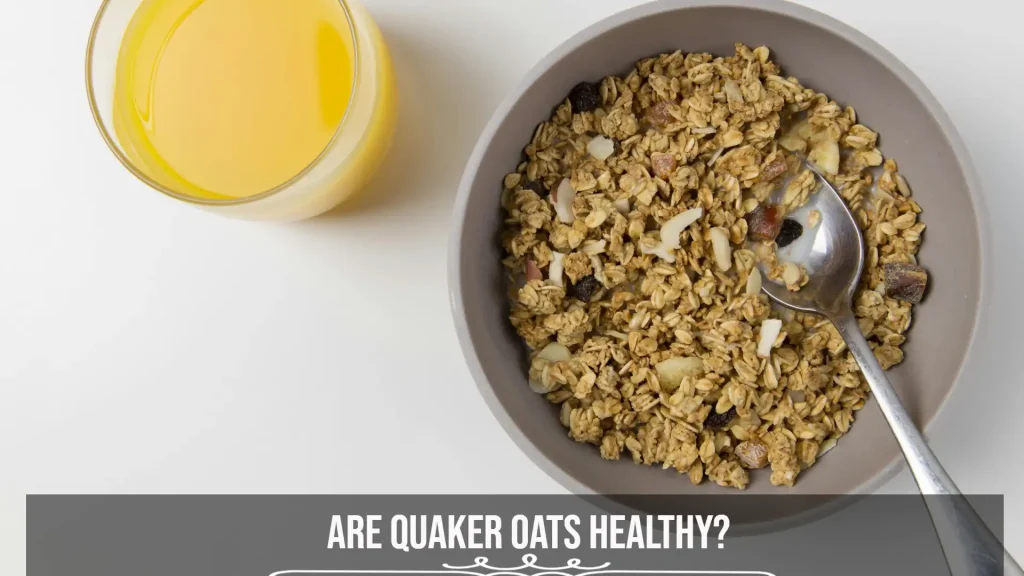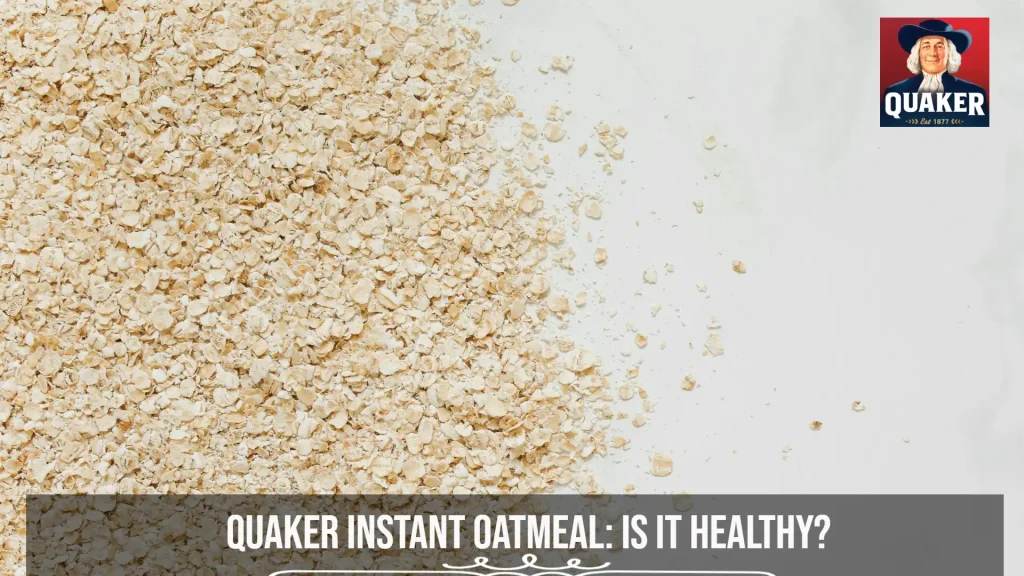When it comes to healthy breakfasts, few foods are as classic and versatile as Quaker Oats. From traditional old-fashioned oats to convenient instant oatmeal packets, Quaker Oats has been a pantry staple for generations. But beyond being affordable and filling, what makes oats truly special is their nutritional profile.

In this detailed guide, we’ll break down Quaker Oats nutrition facts, explore their health benefits, compare different oat varieties, and answer the most common questions about this wholesome grain.
Why Choose Quaker Oats?
Quaker Oats has been around since 1877 and is one of the most trusted brands for whole-grain oats. Their products are widely available, affordable, and easy to prepare.
But the real reason so many people turn to Quaker Oats is simple: nutrition. Oats are a nutrient-dense food packed with:
- Fiber (including beta-glucan, a heart-healthy fiber)
- Plant-based protein
- Vitamins and minerals like iron, magnesium, and potassium
- Low sugar and zero cholesterol
Quaker Oats Nutrition Facts (Per 1 Cup Cooked, 80 g)
Here’s a look at the standard Quaker Oats nutrition label for a 1-cup cooked serving:
| Nutrient | Amount | Daily Value (%DV) |
|---|---|---|
| Calories | 300 | – |
| Total Fat | 6 g | 9% |
| Saturated Fat | 1 g | 5% |
| Trans Fat | 0 g | 0% |
| Cholesterol | 0 mg | 0% |
| Sodium | 0 mg | 0% |
| Total Carbohydrates | 54 g | 18% |
| Dietary Fiber | 8 g | 32% |
| Sugars | 2 g | – |
| Protein | 10 g | – |
| Vitamin D | 0 mcg | 0% |
| Calcium | 39 mg | 3% |
| Iron | 3 mg | 17% |
| Potassium | 403 mg | 9% |
👉 As you can see, Quaker Oats are low in fat, high in fiber, and a solid source of plant-based protein—making them one of the healthiest breakfast choices.
Are Quaker Oats Healthy?
Yes—Quaker Oats are considered one of the healthiest breakfast options. Here’s why:

- Heart Health – The beta-glucan fiber in oats helps lower LDL (“bad”) cholesterol.
- Digestive Health – The high fiber content supports regular bowel movements.
- Weight Management – Oats are filling and can reduce cravings throughout the day.
- Blood Sugar Control – Oats have a low glycemic index, making them suitable for people with diabetes.
- Energy Boost – The complex carbs in oats provide long-lasting energy.
Quaker Oats Varieties and Their Nutrition
Not all Quaker Oats products are the same. Let’s break down the major types:
1. Quaker Old-Fashioned Oats
- Made from rolled whole-grain oats
- Cook for about 5 minutes
- High in fiber and protein
- Nutrition per 1 cup (80 g cooked): ~150 calories, 5 g protein, 4 g fiber
2. Quaker Instant Oatmeal
- Pre-cooked, dried, and cut thinner for quick cooking
- Convenient but sometimes contains added sugar and flavors
- Nutrition varies by flavor: Plain instant oats are healthy, but flavored ones can have up to 12 g of added sugar
3. Quaker Steel-Cut Oats
- Minimally processed oats cut into small pieces
- Chewier texture, longer cooking time (~20–30 minutes)
- Slightly higher in protein and fiber compared to rolled oats
4. Quaker Quick Oats
- Similar to rolled oats but cut into smaller pieces
- Cook faster than old-fashioned oats
- Still nutritious, though the texture is softer
Calories in Quaker Oats
- 1 cup cooked Quaker oats (plain): ~150 calories
- 1 cup dry Quaker oats: ~300 calories
- Flavored instant oatmeal packet: 130–160 calories (plus added sugars)
👉 If you’re watching calories, go for plain oats and add natural toppings like fruits, nuts, or honey in moderation.
Protein in Quaker Oats
Protein is essential for muscle repair, energy, and overall health. Oats are one of the best plant-based sources of protein:
- 1 cup Quaker Oats (cooked): ~5–6 g protein
- 1 cup dry oats: ~10 g protein
For a protein boost, pair oats with:
- Greek yogurt
- Peanut butter or almond butter
- Chia seeds or flaxseeds
- Whey or plant-based protein powder
Fiber in Quaker Oats
One of the standout features of Quaker Oats is its fiber content.
- 1 cup cooked oats: ~4 g fiber
- 1 cup dry oats: ~8 g fiber
The beta-glucan fiber in oats:
- Reduces cholesterol
- Improves gut health
- Helps with satiety (feeling full longer)
Quaker Instant Oatmeal: Is It Healthy?
While instant oats are convenient, they’re not always the healthiest option.

✅ Healthy: Plain Quaker Instant Oats (no added sugar, just oats)
⚠️ Less Healthy: Flavored instant oatmeal packets (may contain high sugar, sodium, and artificial flavors)
Tip: Always check the nutrition label before buying.
Quaker Oats Ingredients
The core ingredient in most Quaker Oats products is simple: 100% whole-grain oats.
Some flavored or instant varieties may also include:
- Sugar
- Artificial flavorings
- Sodium
- Preservatives
👉 For the healthiest option, stick to plain Old-Fashioned or Steel-Cut Quaker Oats.
Key Vitamins and Minerals in Quaker Oats
- Magnesium – Supports nerve and muscle function
- Iron – Prevents anemia and boosts energy
- Phosphorus – Important for bone health
- Potassium – Regulates fluid balance and blood pressure
- Zinc – Boosts immunity
Health Benefits of Quaker Oats
- Lowers Cholesterol
- Beta-glucan fiber reduces LDL cholesterol.
- Supports Weight Loss
- High in fiber and protein, it keeps you fuller longer.
- Stabilizes Blood Sugar
- Slow-digesting carbs reduce blood sugar spikes.
- Boosts Energy
- Provides steady fuel for workouts and daily activity.
- Versatile and Budget-Friendly
- Can be used in smoothies, pancakes, muffins, granola, and more.
7 Health Benefits Of Eating Oats
FAQs on Quaker Oats Nutrition Facts
Quaker Oats contain around 150–300 calories per serving, 5–10 g protein, and 4–8 g fiber, depending on portion size.
Yes, 1 cup of dry Quaker oats has about 10 g of protein, making them a good plant-based protein source.
Yes, oats are high in fiber, low in fat, and help with satiety, making them ideal for weight management.
Plain oats contain only natural sugars. Flavored instant oats may have added sugar.
Yes, if plain. Flavored versions may contain excess sugar and sodium.
Pure oats are naturally gluten-free, but cross-contamination can occur unless labeled gluten-free.
Yes, oats have a low glycemic index and help stabilize blood sugar.
One cup cooked oats = ~150 calories; one cup dry oats = ~300 calories.
Yes, Quaker produces rolled oats, steel-cut oats, and instant oats.
They are rich in iron, magnesium, phosphorus, potassium, and zinc.
Yes, thanks to beta-glucan fiber.
Yes, it’s a nutritious and filling breakfast for children.
Yes, daily consumption supports heart health and digestion.
Minimal processing for old-fashioned and steel-cut oats; instant oats are more processed.
Yes, when combined with protein sources, oats support muscle growth.
References:
- USDA – Oats Nutrition Profile
- Harvard School of Public Health – Oats and Health
- Mayo Clinic – Oatmeal and Cholesterol
